To set things straight, I’m not in either the “religion is evil” or “spirituality is nonsense” groups.
I’m that weird outlier who’s hanging out on the outskirts holding up a sign that says “BOTH are good and BOTH are bad folks.”
As someone who was raised in a fundamentalist Christian faith (and kissed that goodbye years ago!), and has been on the spiritual-but-not-religious path for over a decade, I find myself in the middle. I often straddle the line between religiosity and spirituality knowing that each has its own strengths and weaknesses.

Spiritual Wanderer Course:
Being a lone wolf and a spiritual wanderer is a sacred calling in life – a unique and alchemical path of awakening. You don’t need to feel lost, alone, or stuck on your journey any more. It’s time to meet your soul’s deep needs for clarity, self-acceptance, and empowerment. Let us show you how …
Sure, I can understand why people either hate religion or elevate spirituality (and vice versa), but I’m not interested in perpetuating division – our world has enough of that already.
There is a lot of beauty and depth in both religion and spirituality, and before we “throw the baby out with the bathwater,” I want to offer you, dear spiritual wanderer, some food for thought; something to meditate upon and contemplate.
Firstly, this article will explore the differences between spirituality vs religion for the sake of clarity, but it will also touch on a third path which I believe is necessary for us to evolve and find peace as human beings.
Table of contents
Spirituality & Religion Definitions
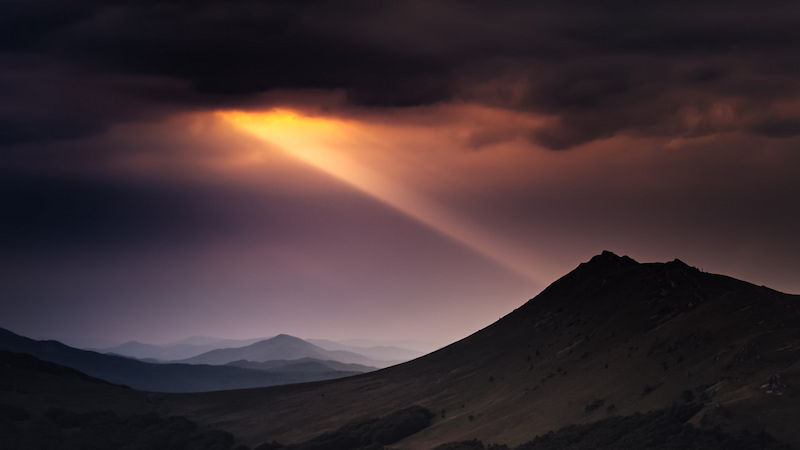
As I explored in my previous article entitled “what is spirituality,” I define spirituality vs religion in the following ways:
What is Spirituality?
The word “spirituality” comes from the Latin word spiritualis, which means, “breath; of the spirit; air.” (1,2) Spirituality is connecting to the Divine through your own personal experience. It is primarily concerned with finding, experiencing, and embodying one’s true spiritual nature.
What is Religion?
The word “religion” comes from the Latin word religionem, which means, “respect for what is sacred, reverence for the gods; conscientiousness, sense of right, moral obligation.” (1) Religion is connecting to the Divine through someone else’s experience. It is primarily concerned with believing in, following, and obeying the rules created by a certain Deity or spiritual teacher.
Iconic singer David Bowie famously described spirituality vs religion in the following brilliantly irreverent way:
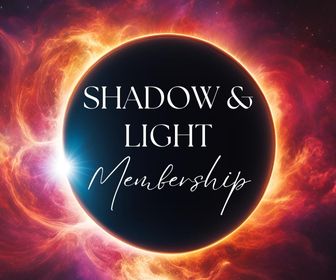
Shadow & Light Membership:
⭐️⭐️⭐️⭐️⭐ "traight from the very first weekly email, this has been mind-blowingly powerful, the synchronicity and the on-vibe contents resonate uncannily with my soul’s current challenges."– Marie
Religion is for people who’re afraid of going to hell. Spirituality is for those who’ve already been there.
Why We Hate Religion & Think Spirituality is Woo-Woo

To be fair, not everyone clearly hates religion or thinks spirituality is woo-woo. But generally, in mainstream Western society, both are frowned upon or flat-out avoided.
Since religion began its increasing decline in the early 20th century which was promoted by the Age of Enlightenment in the previous period and reinforced by the horrors of the world wars, the idea of “God” is now largely seen as not just infantile, but ludicrous.
In the words of Nietzsche, the well-known German philosopher who essentially prophesied the crumbling of religion in the West (“God is dead”):
What do we do with a human God, when we turn to God, precisely because we’re disgusted by mankind?
This kind of statement perfectly summarizes the kind of (rightfully justified) cynicism and disillusionment that we carry toward the popular patriarchal notion of a white dude sitting in the sky, judging all our actions.
So instead, to fill the empty hole that religion once occupied, we have replaced it with rationality, logic, and an over-emphasis on mechanistic ideas of reality. Science has become the new God, or what is known as “Scientism” – a word popularized by Austrian economist F. A. Hayek in the early 20th century.
In a society that values science as the new word of God, spirituality or anything metaphysical (that can’t be directly, empirically, “proven” by the scientific method) is seen to be woo-woo, fluffy, or worse *gasp* … “pseudoscience.”
And yet, regardless of where we stand as a species, we all have an innate drive to seek something higher and greater than ourselves – whether that be God, Enlightened Consciousness, our next-and-best consumerist purchase, or a dogmatic belief that Science is the only “true way” of seeing the world.
I don’t believe that we’re done with religion or spirituality yet – in fact, I believe that we’re not only craving these paths as a species, but we need them.
Religiosity, spirituality, and devotion to something Higher than the ego are basic human needs and intrinsic human qualities. Yes, they have most certainly caused tremendous evil in this world (I’m speaking mostly about religion here), which is undeniable.
But can’t they be salvaged?
Would you like to save this?
Your information will never be shared.
And if they can be salvaged, which path do we walk (if any)?
That’s where my experience, reflections, and discoveries can help.
Spirituality vs Religion: 11 Differences (With Pros & Cons)

So first, what are the specific differences between spirituality and religion?
I’ll explore the differences below as well as the pros and cons of spirituality and religion.
Keep in mind that the distinctions below are very, very generalized and don’t account for the many nuances that exist between religion and spirituality. Nothing is totally black and white.
| Spirituality: | Religion: |
| Personal | Community-oriented |
| Emphasizes wisdom | Emphasizes knowledge |
| Goal is love and freedom | Goal is obedience or salvation |
| Feeling-based | Thought-based |
| Focuses on experiencing internal Divinity | Focuses on obeying or devotion to an external Divinity |
| Present-oriented (heaven is within you now) | Future-oriented (heaven is where you go when you die) |
| Oneness-oriented (we are all One) | Duality-oriented (good/evil, right/wrong, heaven/hell) |
| Informal | Formal |
| Promotes joy, spontaneity, and compassion | Promotes self-sacrifice, devotion, and service to others |
| Low accountability | High accountability |
| Experiential | Theoretical / belief-based |
Let’s break down the individual differences as well as the light and darkness within spirituality and religion below:
Spirituality vs Religion #1 – Personal / Community-oriented
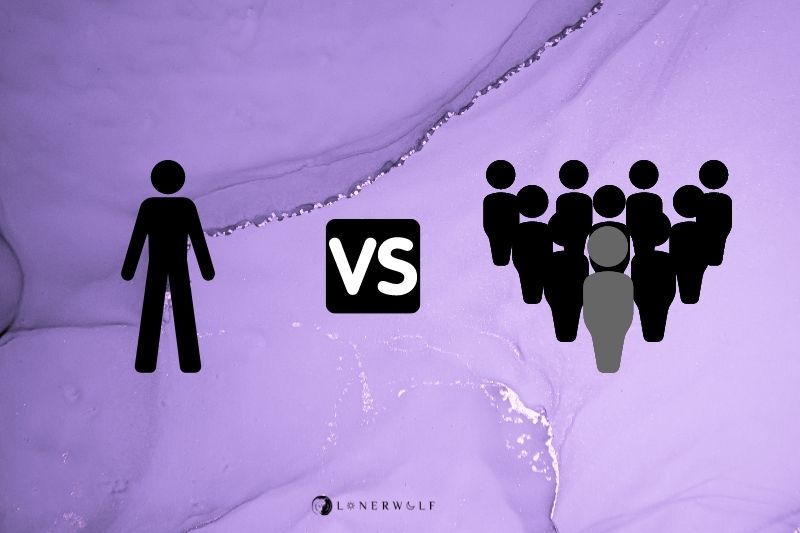
While spirituality focuses on the personal connection with the Divine, religion encourages a community-centered connection with the Divine. In other words, different religions, in general, tend to focus on gathering people together and finding shared faith in one god or ideology.
Pros & Cons:
- Spirituality: While creating a personal connection with the Divine is empowering and transformative, it can also become quite isolating. If we aren’t careful, our spiritual path becomes like a solitary, hermetically-sealed jar that can separate us from others and the world.
- Religion: On the other hand, while gathering in a community helps to ground and motivate us, as well as keep us connected with others, it can sometimes feel disempowering. If we depend on others (i.e., our church, synagogue, sangha, etc.) for our spiritual connection, our connection with the Divine can feel shallow and infantile.
Spirituality vs Religion #2 – Wisdom / Knowledge
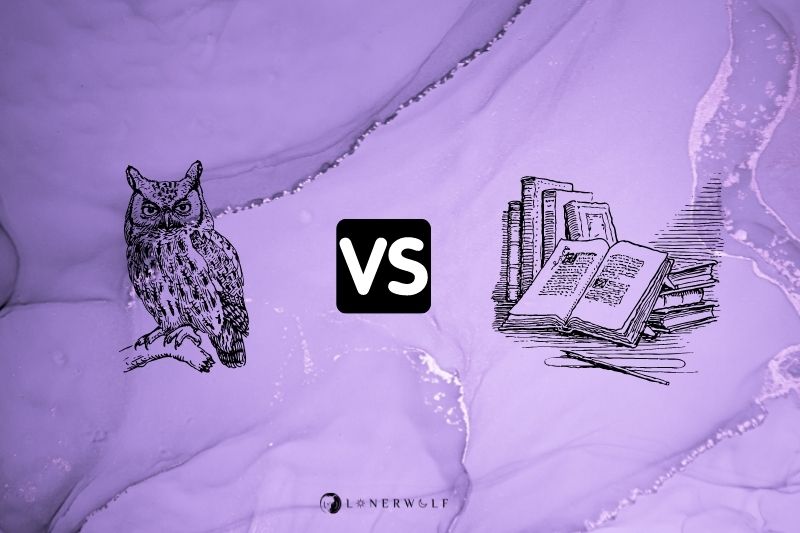
When it comes to using the mind, spirituality focuses on cultivating wisdom. In this case, wisdom means a deep and integrated knowing that is expressed through how we live our lives.
Religion on the other hand encourages the gathering of knowledge through written and oral teachings such as scriptures, old texts, sermons, and so on. Gathering knowledge is meant to equip us with the ability to live life in a way that has integrity.
Pros & Cons:
- Spirituality: Developing wisdom is wonderful and important, but without embracing ourselves as learners and stepping into “beginner’s mind,” we can become haughty. In other words, if we believe that we alone have gathered all of our wisdom, the opposite happens: we become foolish and egotistical.
- Religion: Gathering knowledge is necessary for the development of our mental understanding and the development of various virtues. But if we only focus on becoming learned in what others teach, we lack a connection to our own understanding. Our connection with the Divine then becomes stale and cerebral, lacking depth and pizzaz.
Spirituality vs Religion #3 – Love & Freedom / Obedience & Salvation
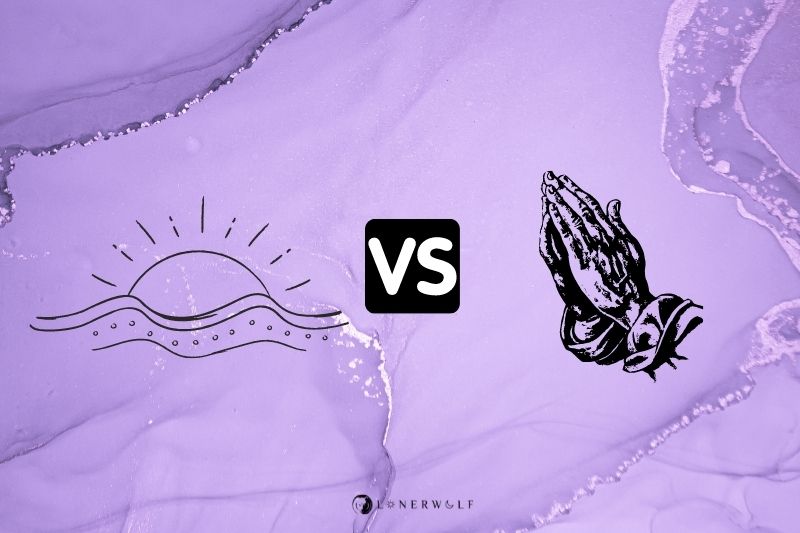
Spirituality, lacking a clear structure, is all about gaining and experiencing love and freedom. Religion, on the other hand, is about submitting oneself to a certain path (i.e., ‘obedience’) and searching for freedom from suffering.
Pros & Cons:
- Spirituality: Seeking love and freedom is a beautiful and meaningful practice that can lead to some life-changing experiences. But without some kind of formal commitment and some kind of recognition of our innate suffering (as religion offers), we can easily lapse into a shallow and watered-down version of spirituality.
- Religion: As for religion, obedience and salvation help to provide structure, groundedness, and humbling of the ego, but they can also lead to a kind of life-denying, grim, and overly regimented way of living. Such an emphasis on obedience can also be a gateway into abuse (as it often is).
Spirituality vs Religion #4 – Feeling-Based/Thought-Based

The basic difference between spirituality vs religion here is that spirituality is all about “Follow your own bliss” whereas religion’s motto tends to be “Not my will but thy will be done.”
Pros & Cons:
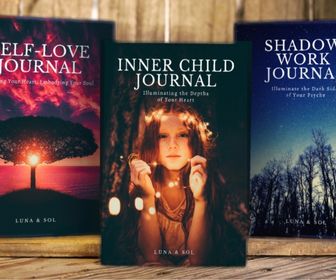
Inner Work Journal Bundle:
Ready to take your spiritual practice to new depths? Our highly-rated set of guided inner work journals leads you step-by-step through processing trauma, transmuting pain into power, and finding transformation through deep healing and self-illumination.
- Spirituality: Listening to your heart and following your instincts is powerful in that it helps you to feel like the master of your destiny. Furthermore, listening to your soul’s voice helps you to develop more trust in yourself and walk a path that feels authentic. But focusing too much on feelings can result in ego-centrism and spiritual escapism.
- Religion: Rules, on the other hand, help to provide precepts for our lives, especially if they’re based on ancient tried-and-tested philosophies. But rules can obviously be constricting, limiting, and lead to the development of unnecessary guilt and toxic shame complexes.
Spirituality vs Religion #5 – Experiencing Internal Divinity/Obeying External Divinity
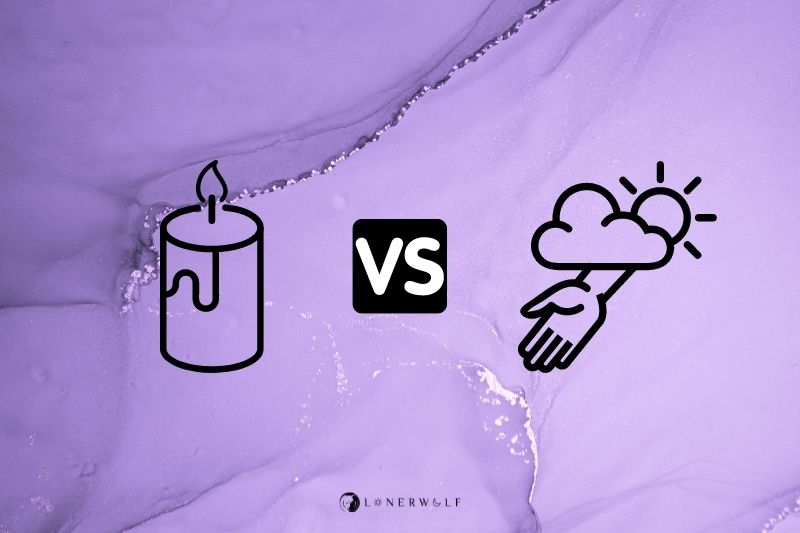
Modern spirituality puts a great emphasis on our personal connection with God/Life/Spirit. We’re encouraged to find the truth within ourselves. Religion, on the other hand, puts emphasis on humbling ourselves to a Divinity that is usually seen as outside of ourselves.
Pros & Cons:
- Spirituality: Without experiencing our internal connection to the Divine (i.e., what spirituality thankfully offers), we feel hollow and empty inside – something always seems missing. And yet, it can be easy to confuse our connection with the Divine with a connection to the inflated ego that seems Divine (see: the spiritual narcissist).
- Religion: On the other side of the spectrum, obeying or humbling ourselves to an external Divinity helps to keep the ego in check. Having something ‘greater’ than ourselves can lead to the development of some wonderful qualities such as receptivity and modesty. But only seeing the Divine as outside of ourselves can deepen the feeling of our separation (aka. ego) which is the root cause of our suffering.
Spirituality vs Religion #6 – Present-Oriented/Future-Oriented
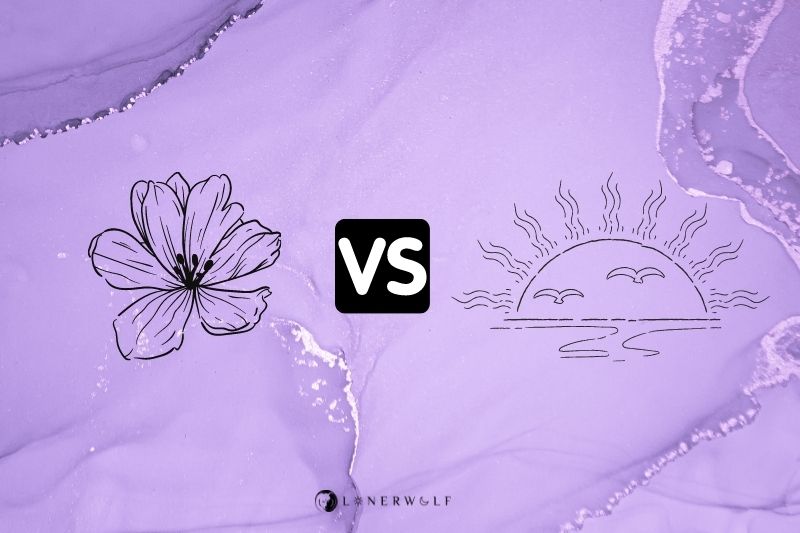
Spiritual philosophies teach that heaven is within us right now with an emphasis on mindfulness, presence, and tuning into our Higher Selves. Religion, on the other hand, teaches that heaven is something found in the future (usually after you die).
Pros & Cons:
- Spirituality: In reality, the present moment is the only moment we have – it’s the only place in which we’re actually alive. As such, there’s a refreshing immediacy to what spirituality teaches and that is that the Divine is accessible in any moment. Such a teaching is highly liberating and encouraging. On the other hand, for those who struggle to stay present or are living in a traumatic situation, this present-moment teaching can be demoralizing and even scary.
- Religion: The other teaching, that now comes from religion, is that heaven or the Divine can be found in the future. For those who need hope and the motivation to keep going, this teaching can be life-saving. But at the same time, seeing heaven as only being in the future can starve us of the ability to find it in the here and now, which is a terrible tragedy.
Spirituality vs Religion #7 – Oneness-Oriented/Duality-Oriented
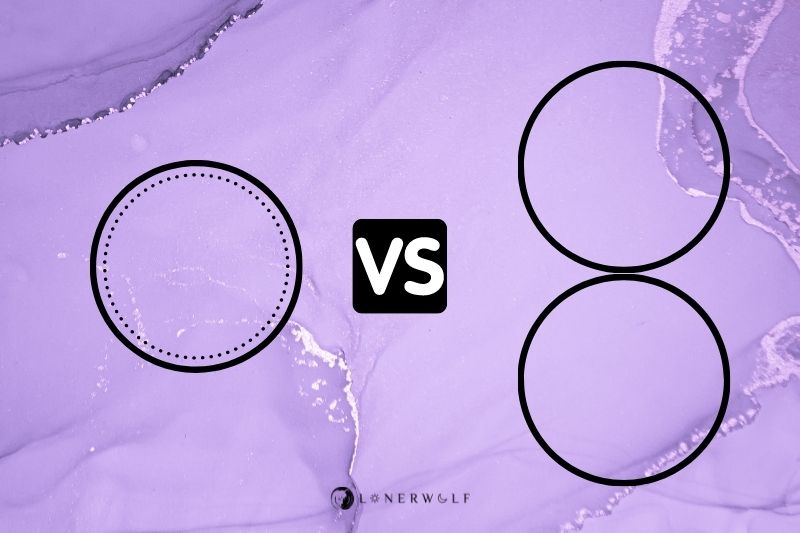
Spirituality teaches us that All is One (non-duality), that there is ultimately no separation between the spark of Divine within us and the Divine that pervades everything.
Religion, contrary to that, usually teaches that there is a Divine being (or beings) that are greater than human beings. Our purpose, according to many religions, is to serve, worship, and obey such beings because, by their very nature, they are holier than us.
Spirituality teaches sacredness – or that the Divine can be experienced, felt, and embodied. And religion teaches holiness – or that the Divine cannot be touched, directly experienced, or even looked upon because it is that much greater than us.
Pros & Cons:
- Spirituality: Seeing ourselves as ultimately One helps to foster feelings of compassion, unity, and interconnectedness; qualities that our world is in desperate need of. Yet despite such a beautiful message from spirituality, too much focus on Oneness can result in a lack of boundaries. Without boundaries, we can lapse into cultural appropriation, avoiding the fact that we are also human, and bypassing the issues of the world by focusing only on a feel-good message of Oneness.
- Religion: Seeing ourselves as separate, which is what religion promotes, helps us to be grounded in our humanity, face the suffering of the world that is caused by us being “less than perfect,” and promote more active social change. Yet the cons of a duality-oriented approach are that it ignores the fact that we’re also sacred at the core of our being – and this denial can deepen our separation from the Divine. Unfortunately, the more separated we feel, the more we suffer.
Spirituality vs Religion #8 – Informal/Formal

There are pretty much no rules at all in the realm of spirituality (other than unspoken codes of conduct like no killing, no stealing, etc.). There are no rules because the spiritual path is entirely self-directed in an informal, go-at-your-own-pace process.
Religion, contrary to spirituality, is highly formal. There are set structures, routines, rituals, and rules one is expected to adhere to in order to call oneself a devotee.
Pros & Cons:
- Spirituality: Informal spirituality allows us great freedom to explore and expand at will. However, the downside is that it can get scattered, unfocused, and confused easily. Also, with a lack of formality, there can come a lack of dedication as well.
- Religion: Formal religion allows us to focus our energy while also offering a ritualized way of ‘committing’ to one path. While spirituality can help us go broad, religion can help us go deep because it gets us to focus on one thing only. However, the formal structure of religion can easily become rigid, suffocating, stuffy, and outdated if the practitioners aren’t open to growth and change.
Spirituality vs Religion #9 – Joy, Spontaneity, Compassion / Self-Sacrifice, Devotion, Service to Others
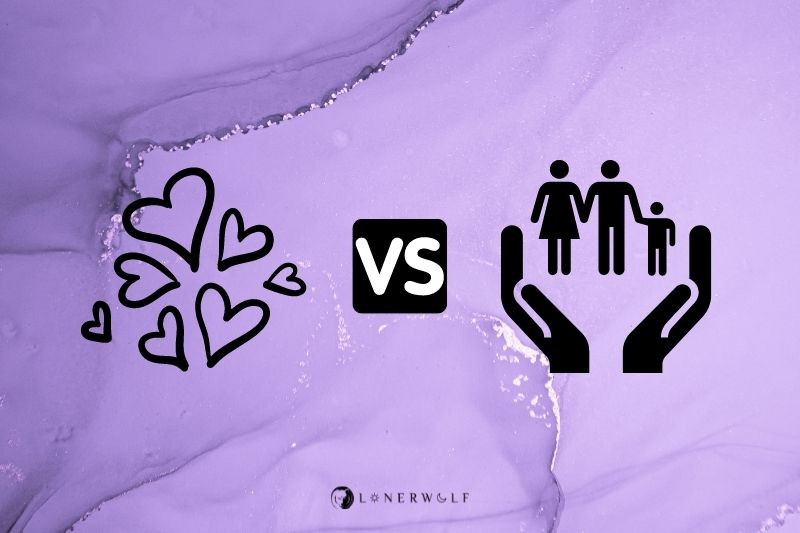
Experiencing and developing joy, spontaneity, and compassion on the spiritual path helps us to feel as though we’re truly living life to the fullest. Whereas within religion, self-sacrifice, devotion, and service to others support us in feeling like we have a mission or greater purpose.
Pros & Cons:
- Spirituality: Spirituality puts a lot of emphasis on “high vibe” emotions and experiences such as the qualities of joy, spontaneity, and compassion. These are clearly highly enjoyable emotions and states of being to experience. And yet, when we only focus on these sparkly “good vibes only” emotions, we can bypass the pain that is clearly apparent in the world. Sometimes, trying to chase these feel-good experiences can lead to excessive self-absorption to the detriment of others.
- Religion: Religion emphasizes self-sacrifice, devotion (to something greater than ourselves), and service toward others who are suffering. These qualities help us to cultivate humility, focus, and a wider awareness of the pain around us. When we feel sorry for others, we’re moved to try and do something for them. But when there’s too much focus on self-sacrifice, we can become martyrs who hurt ourselves and those around us. (Some religions take this to the extreme in the case of self-immolation and suicide bombings.) Devotion to the wrong cause can create more harm than good.
Spirituality vs Religion #10 – Low Accountability/High Accountability
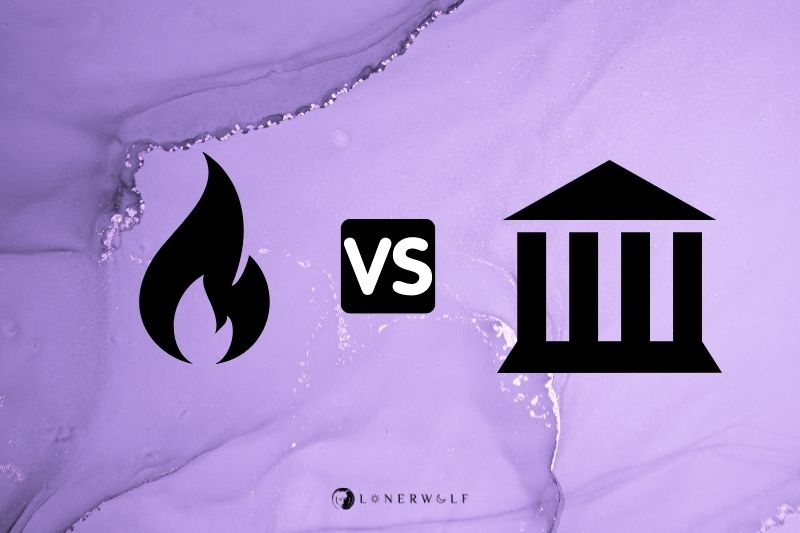
Because spirituality is self-directed and all about one’s personal connection with the Divine, there’s low accountability. There’s no one else to tell you where you’re going wrong but yourself.
With religion, there is a high level of accountability often built into the structure of religious institutions. Usually one has access to a priest, bishop, rabbi, monk, nun, etc. within the religious organization.
Pros & Cons:
- Spirituality: Low accountability in spirituality enables the practitioner more freedom to be fluid, change, and experiment, without the fear of being judged. However, low accountability can also mean that the spiritual seeker has low commitment which may lead to a shallow, misleading, or immature practice.
- Religion: High accountability means that there is a higher level of commitment, focus, and in some cases growth. But with higher accountability also means more pressure and fears of being rejected or judged negatively which can lead to deceptive behaviors.
Spirituality vs Religion #11 – Experiential/Theoretical
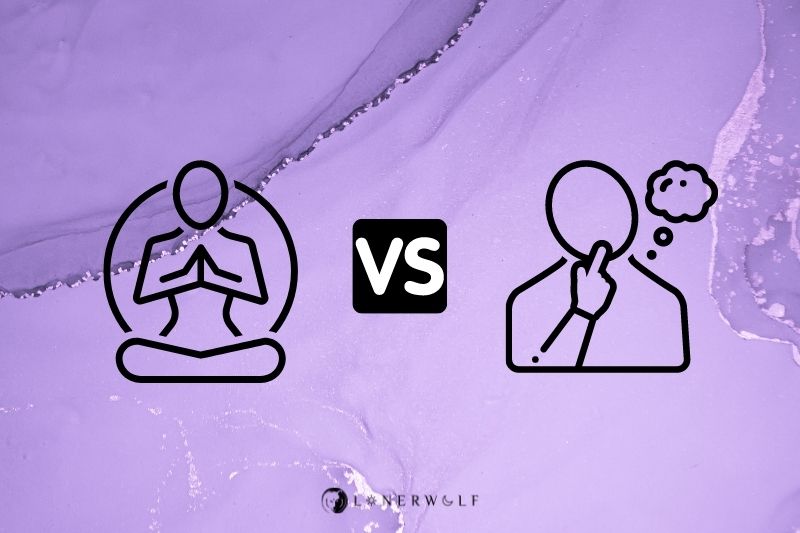
Spirituality is all about experiencing, feeling, and embodying the Divine. It’s centered around doing the work or in different terms, getting “hands-on experience.”
Religion is centered around the theoretical; it’s about learning, understanding, and devoting oneself to a certain belief system. It’s focused on internalizing different teachings about the Divine, and is, therefore, more theoretical and thought-based.
Pros & Cons:
- Spirituality: An experiential approach means that one can have a direct understanding of the Divine, which can lead to some profound realizations and spiritual awakenings. And yet, having amazing spiritual experiences can be quite addictive once we have them. Without the appropriate knowledge, we may struggle to integrate them.
- Religion: A theoretical approach can soothe our mind’s craving to ‘know’ and give it some kind of direction. But too much theory can starve us of the crucial need to actively experience the Divine. In some cases, too much focus on theory can be a self-protection mechanism enacted by the ego to avoid the ego-dissolving influence of direct spiritual experience.
The Third Way: Mysticism

God is an infinite circle whose center is everywhere and whose circumference is nowhere.
– Nicholas of Cusa
The kingdom of God is not coming with things that can be observed; not will they say ‘Here it is’ or ‘There it is’, because the kingdom of God is within you.
– Jesus
As you can see, there are good and bad things about spirituality and religion. There’s no black and white here. Both can enrich or demoralize our human experience.
At its most infantile form, spirituality can become new age fluff that lacks depth, commitment, accountability, the ability to create meaningful social change, and credibility. And at religion’s most infantile form, it can be a force of destruction that creates more division and suffering.
I have directly experienced both spirituality and religion in their most toxic states, and I’ve also experienced the benefits of both. So why the need to keep one and discard the other?
If you feel called toward specifically spirituality or religion, you’re in your every right to do that. Your life path is your own and I encourage you to pursue that which calls to you. (Just please try to spread love and peace. :) )
But there is a sublime opportunity present within the heart of both spirituality and religion. The “spirituality vs religion” debate only creates more hatred and ill will in the world, and yet, when we dare to combine the two, we have what I call a “third way” forward. We have a path of integration, depth, and tremendous power for good.
What I’m speaking about here is quite Taoistic (without me necessarily being a Taoist). On the one hand, we have religion which is a very yang force. On the other, we have spirituality, which is a very yin force.
Religion is the form, and spirituality is the formlessness. Religion is the container and spirituality is the contents. The two dance together, hand in hand – or at least, they can do.
“How?” you might wonder.
Through mysticism.
Regardless of whether we’re religious or spiritual, the human psyche, the human soul, innately craves for something greater than itself. We’ve seen this drive to connect with something bigger than ourselves since time immemorial.
Mysticism is the common thread running through both spirituality and religion.
For over a decade, we've strived to make this website a haven of free, valuable information. Imagine a world where this knowledge wasn't readily available. If this post sparked a meaningful insight or helped you in any way, please consider a donation as a heartfelt "thank you" for keeping this resource free. Every contribution, big or small, allows us to keep giving back.
What is Mysticism?

The word ‘mystic’ derives from the Greek word mustikós which means “secret; connected to the mysteries” and mústēs which means “one who has been initiated.” (1) As such, we can define a mystic as a person who has been initiated into the mysteries of the Divine.
How is one initiated? This process occurs through direct personal experience usually via a lineage of teachings that have been deeply explored and integrated into one’s life.
There are mystics who exist in all religions and spiritual paths. Some examples include Rumi and Hafiz (from the mystical branch of Islam, Sufism), St John of the Cross and St Teresa of Avila (from Christianity), Ramakrishna and Anandamayi Ma (from Hinduism), and more modern Western figures like Carl Jung and G. I. Gurdjieff.
In the words of Mirabai Starr,
The way of the mystic is this combination of annihilation – annihilation of the illusion of the separate self – and embodiment; of fully inhabiting exactly what is.
You can read more in my What is a Mystic? (12 Signs You’re One) article.
How to Unite Spirituality and Religion in Your Life (Without the Ugly Dogma)
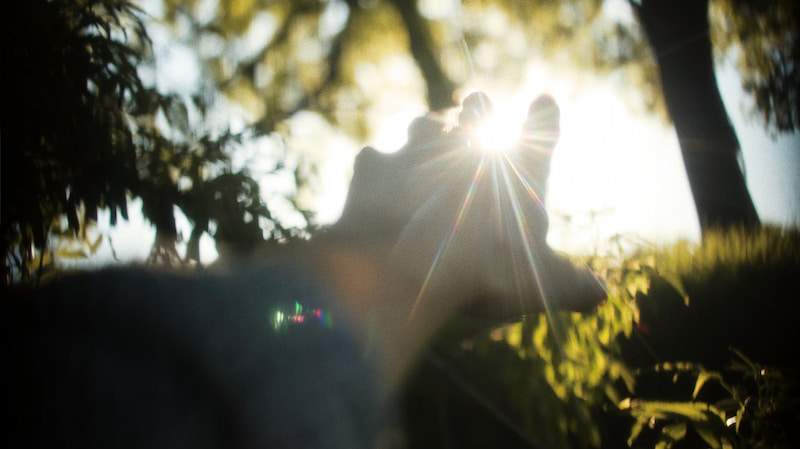
When we unite elements of spirituality with religion and vice versa, we get a robust, deep, and deliciously multi-faceted path that can properly support and ‘initiate us’ into the Mysteries of the Divine.
Without a cup, water spills everywhere. And without water, a cup is empty and lifeless.
Spirituality and religion go hand-in-hand: they are mutually arising. They are twins that can form one Whole if we are open to that possibility.
Everyone has their own unique path, so if you don’t feel called to invite spirituality or religion into your life, that is totally okay. You do you. I’m not there to change that.
But if through your soul work you seek more depth, more enrichment, more support, why not try to walk this third way?
Here’s how you can unite spirituality and religion (instead of spirituality vs religion) into your life:
1. Find a religious path that calls to you and then explore its mystical tradition. Alternatively, if you’re religious, find a spiritual practice or philosophy, then try incorporating that into your religious path.
2. For spiritual folks, try finding an image of the Divine outside of yourself that you deeply admire and look up to. For example, that might be Shiva, Buddha, Mother Mary, Kali, Quan Yin, Avalokitesvara, etc. Learning to connect with this image (and even giving it daily offerings or other devotional practices) will help to empower your connection with the Divine.
3. For religious folks, try listening to the perspectives of people from other religions and spiritual paths. See what you like and resonate with and take note – there are more similarities between you and other paths than you may think.
4. For spiritual practitioners, find a source of accountability that will help to keep you focused and committed. This may be a spiritual teacher you trust, a leader from a religious path you trust and feel safe with, or even a counselor/therapist. Getting ongoing spiritual guidance from someone else will also help to protect against ego inflation.
5. Read through the list of differences between spirituality and religion at the beginning of this article. Bring into your life the opposite quality of whatever you’re used to practicing or embodying. Notice how it helps to create a more rich and well-rounded experience.
Final Words

Peace comes within the soul of people when they realize their relationship, their oneness, with the universe and all its power.
– Black Elk
As someone who was raised in a fundamentalist Christian household, then left and became agnostic, then adopted new age spirituality, then became a practitioner of the occult, and has finally committed to a mystical path, I’ve been on a merry-go-round when it has come to spirituality and religion.
But instead of seeing things in black-or-white terms (which creates division and therefore fear), I see that religion and spirituality can be like sisters, brothers, or friends that support each other harmoniously. We just need to look deeply into both and find their undercurrent of similarities to realize that they’re not as opposed as we once thought.
Whatever path you choose, I hope you find what you’re looking for and know that it’s okay to experiment, and it’s also okay to commit deeply and fully.
What are your thoughts about spirituality vs religion? I’d love for you to share them below in the comments.
Please also feel free to share this article with someone you think might enjoy or benefit from it.
Whenever you feel the call, there are 3 ways I can help you:
1. The Spiritual Wanderer Course: Need "big picture" direction, clarity, and focus? Our Spiritual Wanderer course is a crystallization of 10+ years of inner work, and it can help you find your deeper path and purpose in life as a spiritual wanderer. You get 3+ hours of audio-visual content, workbooks, meditations, a premium test, and more!.
2. Shadow & Light Membership: Want weekly intuitive guidance to support you on your awakening path? This affordable membership can help you to befriend your dark side, rediscover more self-love, and reclaim inner wholeness.
3. Spiritual Awakening Bundle: Looking for a collection of all our essential transformative resources? You get five enlightening ebooks, seven in-depth journals, plus two empowering bonuses to help you soul search, heal, and awaken.





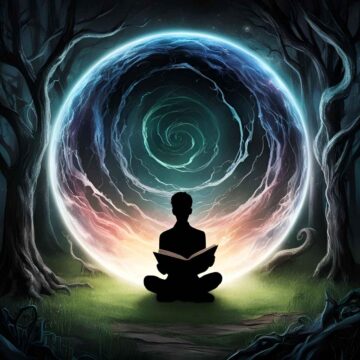


Thank you ♥️ The more I read your articles, the more I appreciate how serene and discerning you are. (Leaving my rebel phase behind ;-) … I hope one not so far away day I’ll be able to finally donate you sth, that is – give sth back… THANK YOU ♥️
So glad this was provided me……… neutral info. Thx so much!!
Thanks Becky 😊
I need help Luna, I want out of religion.
I can tell you the truth dear Sheep.. The truth will help you reject religion instantly.. I sent this globally, to religion websites, universities, media, governments…
To help us stop the wars, tell this to: putin, xi, russia, china, america, south africa, south america, mexico, england, hungary, cuba, iceland, and nk.. This first attached pix clearly illustrates you religion believers state of affairs who are attacking and terrorizing, and destroying the evolved humans of humanity who are humanity’s angels, who are solving the akashic records (heaven’s guide book found inside their angel spirits), who are trying to teach you how you can realize heaven by teaching you angel manners and angel love.. You blind mindless insane religious people fear truth, life, and love.. You hate all that you fear.. Heaven is truth, life, and love at its ultimate maximum.. Because you fear life and love, You fear heaven.. You hate what you fear.. You don’t know it, but you hate heaven.. You fight against heaven by fighting the angels.. You insane people are hell demons sharing hell.. You people Are hell.. You people Are the evil in the war against evil and hell.. You insane people are at war with life, love, heaven, god, jesus, and the angels.. You people Are already in hell.. Your hell-religion dooms you to hell’s end, and your species to extinction, because your religion is an evil terrorist organization and crime, feeding upon you and the world.. Your religion has murdered all of humanity’s primary angels, thousands of them.. Your religion murdered 100-million wise angel women thinkers to prevent them from exposing religion’s crimes.. In you defending your evil terrorist religion you are defending hell itself.. You are blindly numbly destroying heaven on earth at every opportunity for and by religions insanity.. The mess the world is in is because of all of you.. Your religion and its greed and lust is dragging humanity into religions hell, and humanity and all life into extinction.. The wars are religions wars, and you all know it.. Demand religion prove that its lies are truth.. You don’t have a clue what life and love is.. Life to you is eat, shit, pee, fornicate, and sleep.. Love to you is a mouthful of semen.. You shit, is the only way that you know you’re alive… Religion is the war against humanity, life, love, and truth.. Religion doesn’t know even one of heaven’s truths.. Religion doesn’t know where heaven is, nor how heaven works.. Religion doesn’t have even one shred of truth, only insane delusions, fairytale guesses, and made up stories, just ‘bullshit’ to steal your money, so a group of penis-sucking semen-eating fags can live life freely parasitizing humanity like how vampires, swamp leaches, maggots, and zombies feed… Look at artists concept illustrations of hell.. That’s religions end game, humanity’s future.. See the attached picture.. That’s You.. You are murdering humanity for religion… To help us stop the wars, tell that to: putin, xi, russia, china, america, south africa, south america, mexico, england, hungary, cuba, iceland, nk, and the vatican.. Christinsanity murdered humanity… __________________________________ A bit of unrelated added trivia.. All the scientists in the world couldn’t see this… The large rock balls of Costa Rica are obviously turtle and tortoise eggs.. Sea turtles love Costa Rica to lay their eggs in the sand there… The turtles the nephilims brought here were huge, as were all the flora and fauna they populated this terraformed meteorite with… The smaller rock balls found in other places could also be turtle eggs, but some that are purple inside might just be grapes, and some might even be cherries or apples.. Nobody carved them.. Most of them probably came out of big turtle’s butts, and some inland ones might have came from giant plants if there are petrified seeds inside.. I bet some of those large round turtle egg rocks even have the telltale dents in them like turtle eggs do.. If you chip at them with a hammer, there’s a noticeable thin shell covering of petrified turtle shell, it sure isn’t plaster… Show one to an old wise turtle or tortoise, and video its reactions… youtube.com/watch?v=3RZCB5Y1GaY and youtube.com/watch?v=vGKWRqCWl90 (minute: 10:20..) ____________________ A Science group might find this data of interest, so I’ll include it.. I sent all of this it to about 70 majors global, including about 25 universities.. Someone has to wake humanity up to some truth and reality before they kill everyone on the planet with their out of control insanity, what little humanity has remaining… ____________________________ Canada’s Turd sent his gestapo rcmp after me to stop me from saving humanity from its end in defending his insane religious terrorist cult.. Essentially Turd murdered humanity by stopping my alien sciences.. Would be nice if the next new canada PM would allow me to have Turd’s torture device removed from my ear, and establish a court order that stops his rcmp and his ss terrorists from trying to murder me… Humanity isn’t humanity.. Humanity is nephilim… youtube.com/watch?v=dGXydvogzYo Minute: 1:35.. That’s definitely a new species. China probably created that horrid awful species to breed and farm for meat and blood-wine, but they probably didn’t taste good, and/or they were difficult to farm and herd, and/or they just ate too much.. Maybe they were unruly, and attacked, bit, and scratched the farmers too much.. They sure do look like and act like enraged wild monkeys… The nephilim terraformed this dead meteorite we call the earth.. Everything life on the earth the nephilim brought here from four of their farming planets.. YouTube surf ‘mud fossil giants’.. They created us.. They came here to create their prodigy, us.. The nephilim chose this tiny solar system to make us tiny so we wouldn’t go extinct from starvation like they did.. The nephilim are our ancestors, our creators, us.. We are nephilim… We own the 1000 deserted developed nephilim planets, this universe, and the nephilims four spirit home heavens.. but we won’t realize any of it.. Humanity ends here because of Rome’s Catholic Anunnaki Terrorist Organization’s War on Truth and Science… https://duckduckgo.com/?q=scientists+christianity+murdered&ia=web The nephilim created humans by dipping tiny twigs into their semen, then into the vaginas of 12 of their bonobo apes.. The first 12 human’s birth mothers were alien chimpanzees plus nephilim sperm and genes.. Our DNA is 99.9% alien bonobo, .1% nephilim.. The nephilim used bonobo’s as the bio-base to create us.. Each of us has a nephilim spirit molecule.. I found mine, established communication with it, nurtured it, and became it.. We are the aliens.. We were supposed to nurture our nephilim component, become the nephilims, and take over our 1000 planets, and our universe, but the anunnaki space invader dinosaurs stopped us.. Humanity devolved into its bonobo component.. Humanity slipped into hell.. Humanity is alien chimpanzees on the rampage, suiciding… The nephilim went extinct in this universes.. Our planet was invaded by anunnaki 5th dimensional dinosaurs, the universe’s cancerous curse.. I saw two of those anunnaki’s with their shields down.. See attached pix #1.. That’s what I saw… I caught a recording of two of them chatting in their alien lizard dialect of: pops, clicks, squeals, whines, hisses, grunts, growls, frog and lizard sounds… They hide inside humans.. They are in process of turning humanity into their meat herds.. They are turning us into cannibals to make us into their self-feeding cattle.. All our religion is the anunnaki space lizard religion… youtube.com/watch?v=8Av1XB7a0uM youtube.com/shorts/x-5u8ZpgkWo All the subterranean towns on the earth are anunnaki space lizard towns, each with its human breeding, slave training and housing, human meat processing abattoirs, human infant snuff brothels, human blood-wine facilities, and crematoriums… Humanity should nuke those subterranean towns, and rome.. The anunnaki space dinosaurs invaded and conquered the earth 15,500 years ago after our nephilim creators died.. It’s all written in the Akashic Records inside our spirits… _________________________________ I am trying to stop the wars.. This note might do it.. but the anunnaki’s are trying to murder me to stifle and stop their truth from being exposed… Be listening to this while reading.. youtube.com/watch?v=4zqKJBxRyuo You should know, that if we don’t get Trump elected as ‘Emperor Titanium Trump of The League of Nations’ for the next two years, that humanity is extinct in nine years… ___________________________ I have an item I’ve been putting together for several years, in trying to wake humanity up to some reality.. This is my most recent edit of it.. I still have some editing to do.. I’m gonna send it to all the warmongers, major politicians, world leaders, universities, religions leaders, elitist snoots, and the tyrants, in hopes that it might wake them up enough to stop WW3.. If you’re an avid christian, you shouldn’t read it.. If you are and do, you’ll probably need daily laxatives for a year, after you’ve finished cussing at me for exposing your dead-ended hell-bound catholic organized terrorist criminal cult for what it truly is… You’ve been warned… My pen IS the Sword… I was exploring a deep trance meditation, and found my spirit in a thick fog.. A little sword was calling to me in the fog with alluring music from about a tenth of a mile away in the thick fog.. Seems sword chose me.. I picked it up, and noticed that it had already attached its scabbard to my hip… Maybe one day I’ll have it to be able to slice a warship in two with it..? I’d like it to sink all of russia’s and china’s warships with it.. That would be fun eah.. That would wake them up a bit eah… I bet it could slice a planet into quarters if I wished it… The anunnaki’s black knight satellite might be two pieces now… ______________________________ “How do you inform a species that has lost its minds, spirits, and ‘souls’, why it went extinct..? I need some kind quiet soft peaceful noise that helps me forget that I’ve totally failed humanity, and humanity has failed me.. I try blending different meditative tunes together.. Sometimes I get some good mixes… I solved the Akashic Records and the Voynich 100%.. Actually the Voynich simply appeared on my lap one night while I sat at the computer… I found It all.. I tried to teach it to humanity, but Rome stopped me cold, claiming I was one of their fictitious made-up ‘antichrists’, like they did and do to all great spirit scientists who have found the Truth.. Rome destroys evolved humans.. Rome has murdered thousands of honest honorable scientists who only wanted to save humanity from hell.. Rome has murdered 100 million honest honorable thinkers, to prevent their catholic terrorist organization cult’s crimes from being exposed to humanity.. Rome’s terrorist organization murders evolved humans… Rome has tried 70-times to murder me since I was born.. 70-times that I know of.. Bullets have missed me by mere inches, but a miss is a miss.. I am very good at dodging bullets.. Two attempts this month.. It’s all on surveillance video.. Two catholic cult terrorist organization murderers knocked on my front door this month, gripping hidden loaded pistols in their hands behind their backs, on a mission desperate to silence truth for their criminal terrorist cult.. Their solution to silencing truth is murder.. They can’t kill an ascendant.. I am forever.. They all end… I offered humanity its 1000 deserted developed nephilim planets, its universe, its four nephilim spirit-home ‘heavens’, its immortality physically and spiritually.. Rome declared ‘the savior has come and gone, and was rejected’.. When that last evil terrorist cult leader catholic pope died, he attached his vile parasitic anunnaki lizard spirit to the back of my neck and head, expecting me to be his host and ‘taxi to a heaven’, feeling like a hornet sting on my neck and head 24/7, feeding upon me like how vampires and swamp leaches dine.. It took me a whole excruciating week of constant pain of being cannibalized to finally expunge that vile anunnaki hell demon beast from my being, and feed it to hell’s lizard in chunks… I suppose I was humanity’s nephilim savior.. The catholic terrorist organization’s evil elitist greed kooks in Canada attacked my life, poisoned me, damaged my health, robbed my valuables, vandalized my vehicles and property, and tried to steal my well hidden alien science notes, believing possessing my alien science notes would appease and realize them their infantile dreams of avarice, so I burned the 100,000 alien science papers in the garden along with the 100-CD’s, and the two liquid electricity engines.. which was humanity’s future, dictated and directed by the nephilim angel spirits of nephilim spirit home heaven… I couldn’t be letting these dangerous extremely powerful alien technologies get into the filthy paws of violent destructive out of control cocaine-damaged warring alien subspecies bonobo’s.. Their insane warring subspecies would destroy the whole universe with it.. I had no choice but to burn humanity’s future to save the universe from humanity… Humans aren’t heaven worthy.. If we were to let humans into our spirit home heaven, the first thing a human would do would be to pee on the flowers, then kill and eat our little friends, then defecate everywhere and all over the garden walks, then strive to ignite strife, discord, chaos, and war in our spirit home, to try to take control of our spirit home, and us for their fodder, slaves, and disposable sex toys.. Humans in heaven would destroy it all and us.. so I commanded my dragons to attack and devour every human spirit that enters their universe realms.. I own the dragons (the universe’s major dominant fauna) in this universe between planets, solar systems, and galaxies.. I’ve been feeding them my blood as candy treats for 45-years.. I kiss them on their lips, and tickle their tummies.. I am the only love they know.. Everything craves love.. They see me as ‘daddy’.. They obey me… But humans cannot be taught love.. Humans are dead inside.. No human spirit will leave this planet.. No human spirit will realize heaven in their present ill state of affairs… I had called into this universe for a lifeboat rescue planet for humanity because I saw that this earth planet was dying.. In came ‘nibiru’, a small young solar system on her own steam in answer to my call.. She parked just outside this solar system.. To test her resolve I requested she move a million miles closer to me, and park, which she did.. Nasa and religion freaked out when she started to move.. Again I requested she do the same, which she did.. Again Nasa and religion freaked out, claiming ‘nibiru will destroy the earth’.. I needed to build these liquid light engines to exodus humanity to its 1000 nephilim planets.. Nibiru Earth-2 was intended to be for the crud, scum, mindless, and hereditary diseased of humanity, the ones we leave behind.. They would have had two suns and two moons.. I was in process of directing humanity’s survival and heaven when the Rome anunnaki lizards attacked me… I heard in the News that humanity claimed to have hundreds of nukes aimed at my pet solar system, so I had to send her away for her own safety.. You apes will Not! harm even one blade of tropical grass in my pet solar system!.. You apes are too insane kookoo crazy to be permitted free-roam in this universe and in its four nephilim heavens.. Letting you violent psychotic psychopathic narcissistic alien subspecies bonobo’s into our universe and heavens would be like leaving a full box of assorted live hand grenades in an elementary school yard at recess… Provide one good honest reason why the angels would want You in their heaven.. I am so sorry humanity.. I failed you horribly, and you failed me horribly.. You cannot be taught love because you have only delusion, fear, and hate where your love should be.. Devils cannot be magically turned into angels.. Heaven is not for those already hell.. I must quit trying to save your insane species from your insane hell, because it cannot be done.. To be welcomed into the angel spirits spirit home heaven a spirit Must possess pure angelic love for all life, and pure angel manners.. Humanity doesn’t have any love nor manners.. Humans believe they can steal heaven.. To most humans, love is a mouthful of semen, and/or being splattered all over with the stuff, and/or having erect penises wriggling in their vaginas, mouths, and rectums.. Human ‘love’ is quite accurately illustrated in the two disgusting vile internet websites ‘sex(dot)com’, and ‘x-videos(dot)com’.. That’s Not love.. That’s sadistic masturbation.. Humanity is in love only with its stinking filthy sweaty crotches… I wasted my whole life trying to save humanity from its hell.. Trying to help humanity out of hell was like ‘hand feeding chicken chunks to hungry grumpy basking 30-foot nile crocs’.. Humanity is just too darn dangerous to try to help… It is so sad that I must leave my species here to end in its crazy hell, but they leave me no other option.. I try to help them, they try to murder me… I’ve totally failed my species, and they totally failed life, love, heaven, our creators, and me.. Soon they will be extinct in nine years, to the relief of the honorable inhabitants of this universe… The absolute only way a human can realize a heaven is if they on their own steam, brain, mind, and spirit, solve the Akashic Records start to finish, and welcome the spirit of the Voynich into themselves.. There is no other option for a human spirit to realize heaven.. It took me one hour per day consecutive for 24-years to solve the Akashic Records start to finish, not easy, and it is extremely dangerous.. Hell demons cannot survive the associated gamut of 100 deaths involved in trying to solve the Akashic Records, being heaven’s shield against human demons of hell.. The Akashic records teaches the student of life, love, and heaven how to become an angel spirit worthy of heaven… While you are solving the Akashic Records the nephilim angel spirits of heaven are assisting you to succeed, because they want you to be same as them, and to be with them as their spirit family, if you are the same as them… The Akashic Records is in each of us, inside our nephilim spirit molecule… I need some comforting (pianoless!) soft kind smooth soothing elevator spirit meditative mind sleep music to help me forget that humanity has chosen hell over heaven, and that they can’t be helped out of their hell… I own this universe and its four nephilim heavens, but I don’t want it nor heaven.. I found something much better beyond universes.. I’m outofhere after my lady-friend ward passes, then I fly solo with my spirit friends out of this universe, never glancing back at this humanity hell… Some comforting music to help me forget humanity would be nice.. Please suggest such music.. Do you have any peaceful immersive soaking music, containing six secret layers of back-beat rifts, with engineered holes in the layers to allow music to leak up through the layers, in music creating its own music..? Have you tried recording music through fog off the side of a mountain..? Do that, and you would have a new genre which would very likely obsolete all of today’s music genres.. It would probably come to be known as ‘audio coke’, ‘heaven’s music’, ‘angel’s love’, ‘deep soul’… I took seven pure earth spirits to a heaven, but I cannot find anymore pure spirits here on this dying planet in this hateful loveless suicidal hell-bound violent destructive insane humanity nephilim alien subspecies.. It seems impossible to find an eighth angel in their hell.. I must give up… Save yourselves!.. I could build a surrogate little heaven in this universe for humanity’s spirits, but isolated from the rest of this universe, but do I want to build a heaven for this species already in hell..? I don’t know..? All I get from humanity is you remote-viewer brain-sucker vampire-maggot hell-bound cocaino-damaged cannibal-parasites desperately trying to steal love, life, truth, innocence, truth, and science from my brain and mind, desperate to steal heaven, attaching to suck the life out of my spirit, because everything that tastes good to humanity’s cannibal alien ape subspecies they deem to be their food.. I sense their invasive attachments like hornet stings on my head.. Instantly I seize the invader dead-inside vile spirit cannibal maggot parasite in a tight spirit fist, deliver it to inner earth hell, slam it hard against inner earth hell’s outer wall, slam several four foot hardwood stakes through it deep into the rock wall, then invenomate its brain with fire and a powerful venom I concocted out of the deadly yellow goop I found in the universe’s core nucleus, is when the pinned cooked demon ceases its growling and squirming, and goes limp, is when that grotesque slimy black hell lizard hell beast comes rushing excitedly across its wall to feed upon my latest offering.. One of my hobbies is slaughtering demons, and feeding them to hell’s lizard… Demons need to know that they cannot steal heaven.. They try, they die… Everyone must personally solve the Akashic Records fully on their own to have the angels assist and invite them into their heaven.. You must survive the Akashic Record’s gamut of 100 deaths.. The Akashic Records teaches you how to defeat the gamut of 100 deaths.. The Akashic Records is the religion of the nephilims our creators, and of the universe and the four heavens.. The Akashic Records is Heaven’s users manual and guide book.. You learn it on your own.. You cannot be spoonfed taught it.. You couldn’t and wouldn’t survive the Akashic Record’s lessons if it were taught because your spirit must learn the lessons.. You can’t teach nor learn spirit lessons from hell.. You learn spirit lessons from those in heaven… You must solve, learn, and resolve the Akashic Record’s gamut of 100-deaths on your own to be heaven worthy.. Human demon bull maggots cannot strong-arm bully their way into our heaven.. Heaven doesn’t want human cannibal demons in itself.. Your anunnaki terrorist organization religious cults are lying to you… One absolutely Must be of angel love and angel manners to be invited into our nephilim angel spirits spirit home heaven.. ‘Judgment day’ is bullshit.. Heaven is not for those already in hell.. Humanity is already in hell.. Heaven is not for humanity.. Sorry, but it just isn’t.. None of you are heaven-worthy… For 60-years I tried to teach you how to be heaven worthy.. You tried 70 times to murder me to stop me from saving humanity from hell, in defending your insane religious terrorist cult’s organized crime and delusion from being exposed for the evil crime it is… Your insane religion is why you war, murder, bully, hate, lie, cheat, steal.. You chose hell over heaven, and got it.. You did it to yourself by living life like an evil demon of hell.. You fear life, truth, and love.. You hate what you fear.. Heaven is absolute life, truth, and love.. Essentially you fear and hate heaven.. Your Karma is Hell.. Wouldn’t want to be you… Some kind soft sweet goddess angelic vocalize peaceful uplifting rising/falling octave drifting immersion music to help me forget humanity would be nice… So what if I’m not like you.. I don’t want to be like you.. You all end in hell… If you want to try to end the wars, then kindly forward this email to all the world’s: tyrants, dictators, warmongers, religions, politicians, greed-saturated loveless soulless hell-bound corporate elitist pigs, the global media, all the universities, all the Science forums and Science establishments.. Most of them are blocking my emails.. They can’t handle any truth… I have too much on my plate taking care of this dying eldery lady, and trying to restore my health after the evil hell-bound catholic organized terrorist cult attacked my life, stopped my alien sciences, destroyed my health to silence truth and heaven.. Hell won the great war between good and evil.. Hell’s evil won the war between heaven and hell on and in the earth.. The anunnaki lizard planet invader’s catholic hell terrorist organization won their suicide, their hell, their extinction, and yours.. I’m ashamed of you humanity.. Your insane dead-ended hell-biased religions and you are the great evils you all fear.. Gaze into the Mirror of Truth you sore-ass semen-eating bonobo-demons of hell… Provide one honest reason why a heaven would want you in it… ___________________ P.S.: For 50-years I tried to teach your species love, honesty, and kindness, to try to save you from your hell.. I offered you heaven on earth, your 1000 deserted developed nephilim planets and the means to get to them, your universe, your four nephilim heavens, immortality physically and spiritually… What did you do..? You beat me up.. You cut the brake-lines on two of my mum’s cars.. You murdered my mum with poison.. You tried to murder me 47-times this past 20-years.. You tried to murder my lady-friend.. You smashed-up my lady-friend’s new SUV in trying to murder her.. You tossed dead animals into my food garden.. You drilled a large hole in my house roof to let the rain in.. You stole my possessions, weapons, and gold.. You poisoned my front lawn.. You poisoned my bushes and trees.. You made mud ruts in my front yard by driving your vehicles over my lawn in spring.. You tossed rotted meat in my yards.. You tossed broken tree branches onto my food garden onto the tomato plants.. You tossed garbage and your spent bloody tampax’s in my garden, and onto the house roof.. You poured poison onto my food garden.. You tossed your garbage onto my front lawn.. You emptied your vacuum cleaners onto my front lawn.. Ten of you rcmp cops forced your way into my home, and handcuffed me, dragged me away, locked me up, and poisoned me, and irradiated my brain, irradiated my blood, poisoned my heart and organs, instilled parasites into my body.. You locked me up, and made me sleep on the floor in a filthy stinking closet.. You fed me banned dangerous drugs in the food.. You forced a ringing electronic torture device in to my ear, and block its medical removal, and have been torturing me daily with it since February 10/2010, and still are today… Right now (Feb. 1/2024/11:30AM) you have it set so fine that it is vibrating and stinging all my teeth, my right ear and right eye… Is that how demons of hell have fun..? Two T-3’s take some of the pain away, but I’m running out of T-3’s… You put water in my truck’s gas-tank a week before crismas, two years in a row… You put oil in the truck’s brake fluid.. You loosened the wheel nuts on two of my truck’s wheels to maker the wheels fall off.. You stole all the valve covers off tires… You poked holes in the sides of my truck’s new set of tires.. You shoved plastic into the key-hole of my truck’s ignition key slot.. You cut my truck’s brake-line and gas-line.. You loosened my truck’s battery terminals.. You’ve followed me with police helicopters.. You tried to ram my truck with rcmp police vehicles at intersections three times.. You telephoned me, informing me I had won a contest for a free dinner at your plush big city restaurant, so you could feed me your poop, some poison, and murder me.. You ransacked my home sheds and possessions for two whole days desperately trying to find my well hidden alien science notes to steal, expecting by having my science notes you would instantly realize and satisfy your infantile dreams of avarice.. Not all the scientists together could understand my science notes, as I’ve written them in nephilim hieroglyphics… You tried to steal my science notes, so I burned the 100,000 science papers, the 100 CD’s, and the two liquid light engines in the garden.. Your evil forced me to burn humanity’s future, so wild destructive evil alien subspecies chimpanzees wouldn’t have these dangerous technologies.. By stopping my sciences you apes murdered humanity, and doomed all humanity to hell.. Did destroying so much make you lame little monkeys feel like men..? Did it give you orgasms..? You stole my floor jack and air compressor.. You broke into my shed twice, and stole my fine micro-tools, and driver bits, and things.. Now my old truck won’t start. You did something to damage my truck’s electrical system a couple months ago.. You tossed dead rats onto my driveway.. You tossed broken glass onto my yards and onto the driveway.. You invade my home phone and internet connection.. You tamper with, slow down, and redirect my medical notices postal mail.. You have destroyed five of my computers.. Your retired homosexual rcmp police officer three doors down shoots his pistol into the air at night while I’m working in the backyard.. He has a camera aimed at my yard, and his monitor screen showing at his back kitchen window, to terrorize me.. I setup a blind between him and my outdoor workbench.. I heard him shout in his house to his female: “Doesn’t he know that it’s illegal to block police surveillance?”… You sent your hit-man murderer to follow me.. I knew him, your good citizen killer who calls himself ‘the old king’ from Penticton BC.. The family that was recently murdered in Penticton was the hitter for the rcmp.. They sliced up his face to make him unrecognizable to the press and the lawyers.. He came to this town to murder me.. I recognized him.. I had met him before when he was drunk.. I got a good video of him following me to try to kill me.. I sent the video top lawyers, and mentioned it on the phone.. A few weeks later the rcmp slaughtered him and his family to prevent a court from squeezing all the crimes and murders he did for the rcmp out of him… You had two pairs of murderers knock on my front door, with their hands gripping loaded pistols in their pockets.. I read about what you did to my friend Alfred Narayana in Toronto.. He was a scientist too. He was one of your saviors too.. He wanted to save humanity from hell too. He started ‘Mind Awareness Schools’. You knocked on his door, and shot him dead at his front door like you tried to do to me five times… Everyone who has studied and learned spirit-science, who has found the path to heaven, who tries to share it with your species, you demons of hell murder, in defending your insane dead-ended religious hell-cults from truth… Look what you demons of hell did to Mr. Plato, to Mr. Socrates, to Mr. Tesla, to Mr. Jesus.. May I hear or read your reason you hell-devils are doing all that evil to humanity’s greatest scientist and nephilim savior, please.. May I see a copy of the court order that says you are entitled to do all that evil to my life, please… What crime are you accusing me of..? Why do you want humanity and yourselves to go extinct, and end in hell..? Maybe you should visit Shrinks, and get some strong head-pills, and emergency exorcisms, and try to wean yourselves off of that dangerous mind-killer spirit-killer hell-candy deadly cocaine-poison.. That cocoa-leaf poison turns you into a zombie.. It melts your brain, mind, spirit, and soul.. It turns you into a mindless dead-inside hell-demon cannibal… I’m lucky I’m old (76).. I was going to make it to 100 but you kooks took that away from me.. I hope you don’t expect my help to get you to and into a heaven.. Soon my body will be over, and I’ll be off of this hell-planet, out of this filthy dying pest infested universe, far far away from you demonic hell-demons… Save yourselves humanity.. You killed everything good.. You chose hell over heaven, and got it.. You do so deserve hell and extinction… GIT! your fingers Out of your bums!.. That’s dirdy.. There’s poop in there… I have access to all the sciences in this universe, and then some… Do you apes even have the brains, minds, wits to solve even an elementary school grade-one arithmetic equation in your heads without cheating with a calculator..? Do you still have a functioning brain..? Can you even solve 17 times 7 in your head..? Provide at least one honest reason why heaven wants the likes of you in itself.. What value are you to life, universe, heaven, and to a ‘god’..? How much evil have you done to life..? How many innocent lives have you destroyed in your lifetimes..? You are gonna pay hell for all that.. Wouldn’t want to be you… WhooH! If all that crap is what you did and do to your last and only nephilim savior, I’d sure hate to see what you did and do to your families and friends to get your precious ego’s and nuts off… Turdo, You murdered humanity, hell awaits you… ____________________ Some other unrelated stuff.. There’s more about Marilyn Monroe that no one knows.. Add another fact about MM.. Make it 31-facts.. The hour MM died, I was in London Ontario Canada, listening to the radio.. I was 14… The announcer came on telling us that his DJ friend just phoned him from the USA, telling him that Marilyn Monroe has just died of a sleeping pill overdose.. He came back about Marilyn Monroe after two songs.. He said “My friend tells me the ambulance has lost its way to the hospital.. It’s eleven minutes late.. How could they lose their way being only six blocks from the hospital?”.. He chuckled a wicked chuckle.. I wondered what had happened.. Where was that ambulance..? Suddenly my spirit was in that ambulance.. I was sitting on the wooden bench beside the gurney that held Mme Marilyn Monroe.. The ambulance guys were all over her naked body like a herd of feeding hyenas upon a fresh kill.. One was fornicating her vagina, with a frightening evil grotesque demonic wild-animal look on his disgusting ugly face.. One was feverishly biting her breasts, and growling, like he was a wild carnivore tearing-into, eating the last piece of meat on the planet.. One had his penis in her mouth.. One was biting her all over.. I felt MM’s anger for what was happening to her body.. She was still just barely alive.. I reached my hands to her limp left-hand, and held it gently with all my love and innocence.. I felt her spirit relax with me, and felt her anger dissipate into silent peace.. She felt me with her.. I gave her some of my peace and innocence.. Suddenly the guys weren’t touching her, nor near her, as if they had all backed away.. I think maybe they saw me there as a ghost, and got woke, scared, and ashamed… I felt a tiny diminishing jittery wiggle through the air like a tiny wave on a calm quiet lake suddenly vanishing when her body expired.. Her spirit in her human-form sat up out of her corpse like someone waking-up.. She looked at me with a relaxed honorable pure honest loving smile, thought I was an angel, leaned over to me, kissed my left cheek, turned away, looked up, turned into a pure white little cloud gently softly quietly flowing up through the roof of the ambulance.. I followed her, but she was gone like a glowing blue-white streak needle wake of tiny meteorite shooting through space into the universe at the speed of light, gone… Hovering about 50-feet above the ambulance, I panned around at the street below for about 10-seconds.. On the right was a row of prim and proper little houses, all exactly the same, all looking like a classic cover picture of a Home and Gardens magazine.. On the left was a pristine sterile downtown bigcity block park of sparse trees and manicured lawn.. Suddenly I was back on the couch at home, wondering what the heck just happened.. I felt like I had just matured about 20-years.. Everything I looked at was now different and new.. It felt like I had lost all my view-points, that I had a whole new set of view-points to explore and learn.. Now I had to relook at everything to learn and know me.. Suddenly I had 50 new viewpoints to explore in life.. Everything seemed trivial and superficial.. People all seemed infantile, silly, and petty… Suddenly people in authority were bullying and terrorizing me, and trying to murder me, and/or have someone murder me… I didn’t do anything wrong.. All I did was help an honorable pure spirit find heaven.. What was so wrong, illegal, and immoral about that..? God and Lord Jesus made me do it… Why are you hell-people trying to hurt me..? _____________________ About 15-years ago I was having a weird dream about 5:AM.. I was sneaking up behind Mme. Medusa, in her fallen down rubble of a castle.. The neighbor made a loud door slam noise that woke me.. I mentally shouted “NO!”.. I wanted that dream.. I forced myself back toward sleep.. I pushed and pushed till I was back in the dream, totally unaware that I had pushed my spirit and more of me into the spirit realms deeper than dream.. Again I was sneaking up behind Mme. Medusa, in her fallen down castle, but a little more than just a dream, but I didn’t know it.. My foot bumped a piece of fallen down roof sheet metal which went skidding across the bricks making a gosh awful calamity clatter of metal sounds.. probably loud enough to wake the dead.. I said “Don’t look your majesty!”.. She didn’t turn around.. All her head snakes were making up such a fuss, all facing me, angry as h, lunging, hissing, spiting a tremendous hissy storm.. I ignored them.. I made my way to her front, eyes closed of course.. I heard the stories… I made my way up her front using my spirit senses to find her mouth, and ever so gently softly kindly honorably perfectly lovingly pressed my lips onto hers.. Instantly all the snakes went silent.. Her lips felt normal and soft like woman lips.. She felt deathly cold, so I pushed heat from my solarplex into hers till she felt warm.. Maintaining the soft gentle kiss, I ever so honorably reached to her left tight firm little teen butt-cheek, and lovingly honorably squeezed her butt firm and tight, all the while a pest little snake flickered its irritating little snaky tongue all around and in my ear… After about 4 minutes I slowly broke the kiss, ducked down, released the squeeze, and opened my eyes, and calmly made my exit.. all the while her majesty was uttering happy passionate woman moans groans and sighs like maybe she was experiencing her first massive orgasm.. But her voice sounded like she had vocal cords made of tin.. Her tin sounds echoed throughout the remains of the castle.. I ended the dream, or trance, what ever it was… I still wonder what her face looked like..? I still wonder if she had venomous snake fangs in her mouth..? probably… I wonder what color and texture was her face skin..? I still wonder why her voice sounded tinny.. Seems I kissed a real monster… I gave her majesty pure love and honor, man to woman.. Everything wants love and honor, even the lady black widow spiders who let me touch their backs and touch their legs after I talk softly to them a couple minutes to make them feel safe, honored, and loved.. I say “You are such a beautiful creature your majesty, may I touch you gently?”… I bet it would be silly dumb foolish and dangerous to visit Mme. Medusa again, but I am tempted.. Sometimes I feel her calling to me for more, that same time in the morning… All I know about her majesty is that she does have orange snakes on her head, her lips are soft, smooth, puffy, and normal like a young woman’s lips, her little butt cheek is small, smooth, and firm like a petite 17 year-old’s butt, her voice sounds like she has tin vocal cords, and she lives in a fallen down ancient castle… I wonder if I was the only one who has ever kissed Mme Medusa on the lips..? I wonder if she had fangs in her mouth..? probably… I still wonder what her face looks like..? I wonder does she really turn her lovers into stone when they see her face..? I suppose if they are stone then they couldn’t answer that… I probably could have removed her curse with basic sorcery, but I didn’t go there because her curse is why she’s still essentially alive, because her curse stipulated that she have that curse for eternity.. Any ideas how to dismantle only the nasty parts of an evil curse..? I’d like to repair her majesty, and keep her as a pet, and maybe take her into the afterlife with me, but without damaging her immortality… Can anyone tell me why her sounds sounded like she had tin vocal cords..? _________________________ I have a question that needs someones keen expert advice please… From experiencing 10-NDE’s, I discovered Spirit Science like Mr. Tesla and other famous scientists discovered Spirit Science… I had an experience with time travel.. On a hunch I established a tube going slowly back in time.. I inserted my spirit into the tube, and pushed them both back in time, faster and faster.. I was seeing years flash by one per every three seconds, then pushed it to the speed of light, then decelerated, and stopped, and stepped out of the time tube onto ground beside a small lake.. I walked to the plants, and watched large caterpillar bugs chewing on fat leafed sappy succulents.. The forests were just tiny clumps of trees, ‘baby forests’.. Out from a clump of trees a young T.Rex charged at me screaming.. I just stood there thinking it’s just a dream.. The lizard struck my arm shoulder to elbow to the bone with its dagger claw, tossing me about 75-feet in the air.. I got up a ran to a large fallen log, and rolled under a gap between the log and ground.. The lizard clawed at the ground in trying to dig me out.. Frustrated, it changed sides of the log.. While it was moving along beside the log to change sides, I escaped without being noticed, and hid in the trees in the tall grasses.. When the lizard found me gone it did a massive over the top psychotic temper tantrum, running in tight circles, screaming mad, biting at everything, at a rock, at the lake water, at the ground, at a bush, at its knee.. When it bit deep into its knee to it bleeding it screamed and bellered out in pain, then bolted, and ran to and through the trees stomping on my leg, not noticing I was there, in its blind rage in which it was probably ‘seeing red’, then ran down the valley bellering screaming mad… I leapt back into the time tube, and in a flash was back sitting in my easy chair.. My arm was stinging and throbbing big time.. I rolled up my shirt sleeve to see a long jagged bright red mark along my arm same as the lizard slash, slowly fading while the pain slowly faded.. It took it about 20-minutes to vanish and stop hurting… Decades later it still hurts a tiny bit when I press my fingers along that slash spot… Conclusion: Time travel can be bludy dangerous… A year later, at night, I returned to that same spot where the nasty lizard scratched me.. In the extremely bright moonlight I found that bully monster still in its territory, though much larger, sleeping standing, leaning against a tree, probably so the crawly little critters wouldn’t crawl up its nostrils while it slept… I searched for a sharp axe-stone, and a nice oval hammer-stone.. I had a plan.. I picked an easy tree to climb then snuck up silent to the lizard, set my hammer-stone down, knelt on one knee, hauled the sharp rock up and back over my head, firmly gripping my axe-stone in two hands, and swung it down with all I had onto the lizard’s big toe, severing its toe from its foot, dropped my axe stone, grabbed my hammer stone, and ran to the pre-chosen easy to climb tall tree.. Lizard woke screaming bludy hell blue murder.. It chased me, screaming mad ferocious.. I zipped up my tree like a little squirrel, and held my hammer stone high in a firm tight fist.. Lizard mounted the tree, and tried to bite my foot.. While its mouth was wide open and screaming, I swung my hammer-stone down hard and fast as I possibly could, striking its longest fang, knocking its big tooth clean out to it spinning through the air.. Lizard fell to the ground on its back, kicking, rolling, screaming, squirming, pooping all over, rolling in its poop, screaming its head off, its eyes all bulgy red and teary.. It glanced up at me.. I grinned, and made a little ‘grrr’ growly sound.. It got up in shock and fear, and in a Lot of pain, it’s mouth and toe bleeding.. It bolted, and ran down the valley limping, tripping, stumbling, crying, screaming for its mummy, probably waking-up the whole neighborhood… I collected my two trophies, held them high, and proudly screamed a loud warning to the jungle, then hid them under a large flat rock beside a cliff.. I’d like them on my computer desk, but I don’t know if it’s safe to bring something back in the time tube..? Maybe it requires a special isolation container..? I don’t know.. I won’t risk it… Lizard probably died slow and painful from the infections from its wounds.. Payback for it attacking me, and clawing my arm in trying to kill and eat me.. I’m a little bit dangerous.. Seems I beat the living shit out of a T.Rex… My question: Can I safely bring those two T.Rex trophies back in the time tube..? I do so very much want them on my computer desk… ___________________________ I have five sweetheart lassies who often accompany me on deep trance experiments into the universe and beyond.. About 8-months ago I requested my sweetheart angels teach me love.. The next night I found myself in a pleasant colorful epic dream, way back in prehistoric times where and when the T.Rex roamed.. I was walking naked behind a world-class goddess-class stunning female who was also naked.. I was walking about 75-feet behind her along grassy hills.. She was strolling calmly with the confidence and demeanor that she owned the planet, and the whole planet knew it.. We paused up on the top of a long grassy narrow hill between two mountain ranges, we lay down, with me close behind her to keep her warm, gently gathering up her long strawberry blond hair in a hand, letting it slowly slip off my hand, totally fascinated with the six-inch long golden strand meddles in her hair from the sunlight, brighter and golder than polished gold… I noticed a huge T.Rex meandering in the valley about a quarter mile away.. It saw us.. I paid it no concern what so ever.. In a few minutes the huge lizard was right behind me, leaning its head in close to sniff me.. I paid it no concern what so ever.. I was only interested in the long golden needles in her majesty’s hair in the sunlight.. When the lizard’s head penetrated our soft purple glowing aura, all it could feel was love.. It licked my whole left butt-cheek, then calmly quietly withdrew, and quietly walked away.. Minutes later we rose, and continued our leisured stroll along the grassy hills, me following the goddess angel about 75-feet behind her… I woke thinking ‘That sure was a strange weird dream.’.. Something on my left butt-cheek was feeling like sticky syrup and/or thin mud drying and shrinking on my skin a bit like a large scrape-scab feels like after a couple days healing, or an hour after you get out from swimming in dirty polluted seawater.. I brushed my hand across my left butt-cheek, feeling the drying gooey blobby sticky T.Rex saliva covering my whole cheek where the monster had licked.. It smelled a bit like rotted meat, tooth decay, mildew, and stagnant filthy polluted swamp-water… I thought of taking a biological sample for Science, but passed on it when I thought ‘Then we would have deadly T.Rex’s in our forests, because backyard and corporate science are very careless and irresponsible’, not good!.. I showered the horrid sticky stinking drying shrinking gooy mess off my skin.. It had already digested two layers of skin.. It took a lot of warm water, scrubbing, and soap to get that vile T. Rex goo off my skin.. First aid creme and topical xylocaine helped to ease some of the sting on the red partially digested skin… Back in bed, my first thought was: “Yowzers! It Was Actually Real! A REAL T.Rex actually sniffed, licked, and kissed my ass with respect.. The angel taught me love, as I had requested.. I concluded: ‘So love must then be being honorable and fearless, just living life moment to moment like it’s supposed to be lived’… I thanked my five ‘angel friends’ for the lesson… __________________________ Fearlessness is like when and how I met a huge lady grizzly bear in the forest at 1:30 AM, up close and personal.. If I was paranoid I wouldn’t have even considered it… I walked up to it non-threatening like it was my friend.. Stopped eight-feet from it, bowed saying “Greetings your majesty, it’s an honor sharing your forest with you”, smiled, and sat, and talked to the bear for 45-minutes… I played some head games with the bear.. I freaked her out a bit.. I imagined bringing a huge hand down from the clouds, and imaged giving her a brisk rough shoulder massage with it.. She leaned into the pretend massage.. When she realized I did it, she freaked out, her eyes bulged, she flared her nostrils, she hyperventilated, and she probably pooped and peed herself… Next morning where I slept on three sheep skins half out of the tent on that very hot summer night, she came by at 6:45 AM, and sniffed me head to toes twice.. Each time pressing her nose tight to my butt to get a good sniff.. then she walked away politely… Seems I can confidently claim that a huge wild lady shegriz kissed my butt with respect.. Twice!.. _____________________ Fearlessness is like after the west-coast werewolf that screamed in my ear from the other side of the tent, just a few inches from my ear, making all my skin feel like it was on-fire for about a minute.. I exited the tent, saw that huge slouched black furry monster standing there about 75-feet away, straightened my clothing, brushed my hair back, tossed my pistols and blades into the tent, smiled nice, leisurely walked up to it, paused six feet away from it, bowed pretty, then reached a hand down to between its feet, ever so gently kindly softly furrowing her lady-bits upward perfectly, to running my soft caress up the middle of her chest toward her throat, avoiding touching her throat, placed a soft light gentle hand upon her shoulder, leaned in, and kissed her on the lips from fang to fold and back to fang, till she growled from deep, is when I backed away six-feet, and bowed a lengthy deep bow.. In my peripheral I saw her do a full body rush.. Seems I got to the lady.. We howled at the full-moon together, then she turned, strutting back into her forest, snapping her cutie little black fuzzy butt side to side… Back at the tent I tasted my fingers.. My adrenals emptied to dry-heaving.. All my nerves stung like fire for half an hour from the massive adrenaline overload… Biggest rush you can possibly experience is to taste lady werewolf.. But don’t even think of trying it if you harbor fear and paranoia… My hobby is making friends with monsters.. I am very good at it.. One mistake, you’re dead… I don’t make mistakes with monsters… I live real-time fearless truth, love, honor, respect when near them… Some of the monsters I’ve kissed on the lips, just a glimpse of would have average big hero tough guys, peeing in their panties and shoes, and bolting, and running screaming for their mummies, if their legs still worked… If you fear, you aren’t living life as it’s meant to be lived… Everything in life is connected.. It’s all one.. One won’t hurt itself, unless it’s insane… Look at putin, his fear of life is destroying him and everything and everyone around him, the poor sad snapped guy… A werewolf or grizzly would probably attack and eat him in just seconds… If you want to meet a real werewolf for the fun and excitement of it, then on a warm summer full-moon night near midnight, establish the white light of protection meditation near the edge of a forest where folklore declares werewolves have been spotted.. Send out the famous white light of protection aura for about half a mile all around you, hold it on, and wait.. That thing rushing at you at about 60 mph, screaming like it’s coming from hell itself, is a fun werewolf for you to have some exciting fun with… After tasting lady werewolf now I can call them to come to me in forests for their kisses and tummy tickles.. They are an alien species that the nephilim creators brought here.. They even understand and speak English, and they have a wicked wicked sense of humor… Ladies won’t go camping with me a second time.. Probably because it takes several hours to dry pee-soaked jeans and runners by the fire… __________________________ All that is just one ten-thousandth of it… I tried to save humanity from hell and extinction.. They didn’t want it… They are comfortable with their mass delusion… _________________________________ I did it all different from how school does it.. You don’t need to immerse in anything when there is so much to learn, know, explore, become.. All you need do is familiarize yourself with a little bit of everything to acquire the big picture, like how I did it… It’s too easy.. I did it when I was 14 to 15.. I cleaned up, and took the bus to Western University Ontario (UWO).. At 14, I confidently walked into the university Chemistry building with a list of chemicals and chemistry apparatus that I wanted/needed for my little basement chemistry lab.. I walked into the Dean’s office of ‘The Honorable Mr. Fred Pattison’, and asked his tall red/blond haired secretary if I could speak with the Dean.. Out he came, and invited me into his office.. I explained that I needed specific chemicals and apparatus for my experiments with plants.. He pulled out his Merck Index Chemicals Manual, and quizzed me on all the dangerous chemicals in my list.. I knew what each one was used for.. Suddenly he was phoning the resident Glass-Blower telling him to make everything I requested for free, and phoning the Library telling them to issue me with a library card, and phoning Chemical Stores telling them to pick up my chemicals list, and he handed me the key to the front room of chemical stores telling me to leave the key inside on the desk, and that my chemicals order would be ready noon tomorrow for pick up.. Then he requested that I drop in on the top floor labs cold-call, and chat with them… That was the only time in my whole life that I was ever treated with honor, dignity, and respect.. As I exited his office, and was slowly closing the huge door I heard him say to his secretary in a deep voice “Prodigy”… I told you that so I could tell you this: I used my university library rights to read the bases and ceilings of every Science, every weekend for two years… I didn’t need to know the full contents of each science, only the beginnings and the ends.. The rest, my mind would figure out if I needed it.. I did the same with the world’s bibles, philosophies, schools of thought, martial arts, religions, governance, psychiatry… I did as Mr. Pattison requested in visiting the top floor labs.. I knocked, and was invited in.. The fellow said “I’ve heard about you.. Show me your list of chemicals.. Ok, I have these, but not these, here’s the clean vials and the clean spoons, here’s where the used spoons go.. Take what you need, Don’t contaminate, Tell me when you’re finished”.. Ok, I’m finished.. “Ok, Let me see what you’ve got.. Ok, now I have given you what you wanted, here’s what I have.”.. His lab apparatus was a crammed full lab of black lab-tables covered with attached apparatus, bubbling, boiling, steaming, stirring, evaporating, condensing, moving through glass tubing, ending dripping into a single flask.. “I won’t tell you what it does, only that it stops here,”.. He pointed to a flask that had spinning magnets in it an a tiny flame under it.. “It stops here.. I would love to hear your opinion on it.”.. I slowly panned the whole apparatus assembly from start to end, then focused deeply upon the troubled flask, and stared at it with all of me (eyes, brain, mind, spirit) for a couple minutes while he hovered over me waiting patiently for ‘the big miracle’.. The moment I had a new thought on it I pointed at the problem flask, saying “Why don’t you give it rest right here.”.. He stood straight up with his hands in the air, and Shouted “YES!”, and dove into five huge thick chemistry manuals… I had solved his problem, not knowing anything about university Chemistry… Now I know how to crack the bonds of the inert elements to create 200-million new chemicals.. Humanity doesn’t want it unless they can steal it, is why I burned my 100,000 alien nephilim science papers, smashed the two liquid electricity engines to dust on the anvil, and quit science… I was authoring a new university course ‘Blue Base Eternity the Philosophy of Psychiatry’, but I burned that too.. Editing it was like visiting hell, because almost everything about humanity is insane and scary… The kooks stopped Mr. Tesla cold, stole his notes, burned his lab, and hit him with a speeding taxi to try to murder him.. I sure know how he felt, and how all the thousands of scientists rome murdered felt.. If humans kill my earthy ride, I might slice this planet into quarters.. It’s dead inside anyway, so is the life on and in it.. It’s all extinct in nine years.. Religion killed science and evolution to maintain everything unchanging, to hold humanity back in religion’s dark ages.. They don’t know have a clue what they’re messing with… Forward this note to every university please.. Wake up humanity before its all dead in just under ten years.. I can’t wake them up.. I’ve tried for over 50-years, they tried 70-times to murder me those 50-years… Seems it can’t be done.. It’s like trying to teach rocket science to distemper itchy-bum chimpanzees… I can’t publish it in a book.. Religion and democracy would instantly have the book banned, and would send thousands of murders my way.. In humanity’s world truth is insanity, immoral, and illegal, punishable by death.. Heck! In America they even have anti-religion laws.. In many nations anti-religion gets instant death… Seems I’m playing with ‘Fire’, but if I don’t try, this whole humanity species doesn’t get it universe, nor its heaven, but I can’t fight 8-billion alien monkeys to try to wake ’em up to reality.. I have no op but to quit trying… I wish I could show humanity my heavens, but show them anything beyond their five senses, they shit their pants… The weather is warming up.. Soon I’ll have the nice days to try to diagnose what the kooks did to damage my little pickup truck.. It won’t start.. It’s old, a rusty 1999 gmc s10 sonoma, but it’s all I’ve got.. I wish the worst hell on the assholes who wrecked my truck… I still have all this saved-up forest towns making stuff, for when the food runs out, and the cannibal zombie apocalypse is rampant in all the towns and cities.. but I’m 76, and taking heart meds.. I doubt I’ll have the strength to create rescue forest towns to reboot humanity after the crash.. No one can say I didn’t give it my all to save humanity from hell and extinction.. It can’t be done… All my projects have been crushed by the vatican’s insane terrorist organization.. Humanity can bludywell save itself.. I’m outahere.. I have the rest of life.. I have the universes, the four heavens, and beyond.. You have death and hell, you all end… And those mindless hell-bound morons are still ringing their torture device in my ear… My consolation is that when they die, they are gonna be wondering why there’s isn’t a heaven anywhere to be found when all their religious lies fall off, and they don’t have a clue how to find it… They’ll suddenly mutate into those two-foot diameter ghostly gray spirit heads, baby vampire zombie maggots, falling into hell’s gullet, screaming on their least breath: “help me jesus”… You monkeys ain’t got a bludy clue…
I’m not sure about your context or how much I can support you from afar, Sheep, but if it’s in your heart to leave, you’ll find a way. Also, this website can be of great support to you ❤️
Pleased to see that you know this much. I, however, have one question. Will you answer? This is your test. Both of you, Mateo and Aletheia.